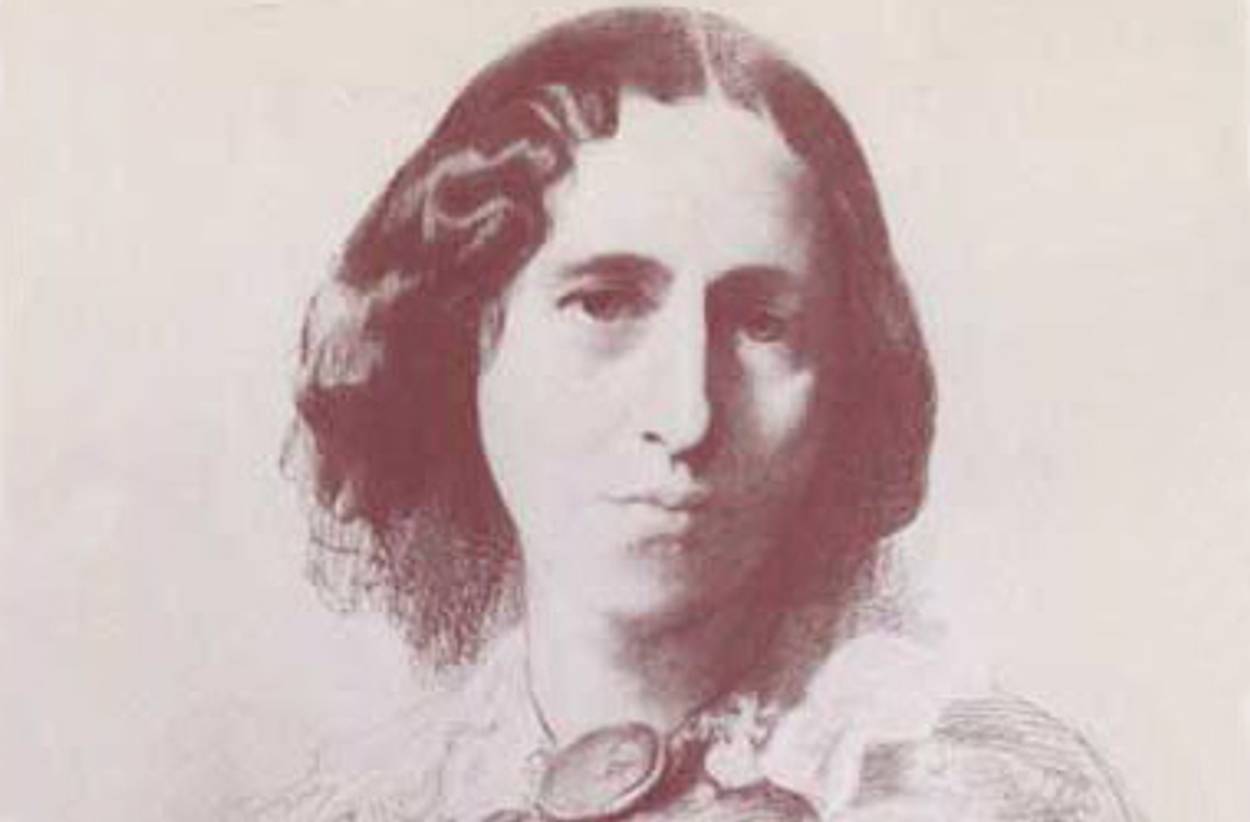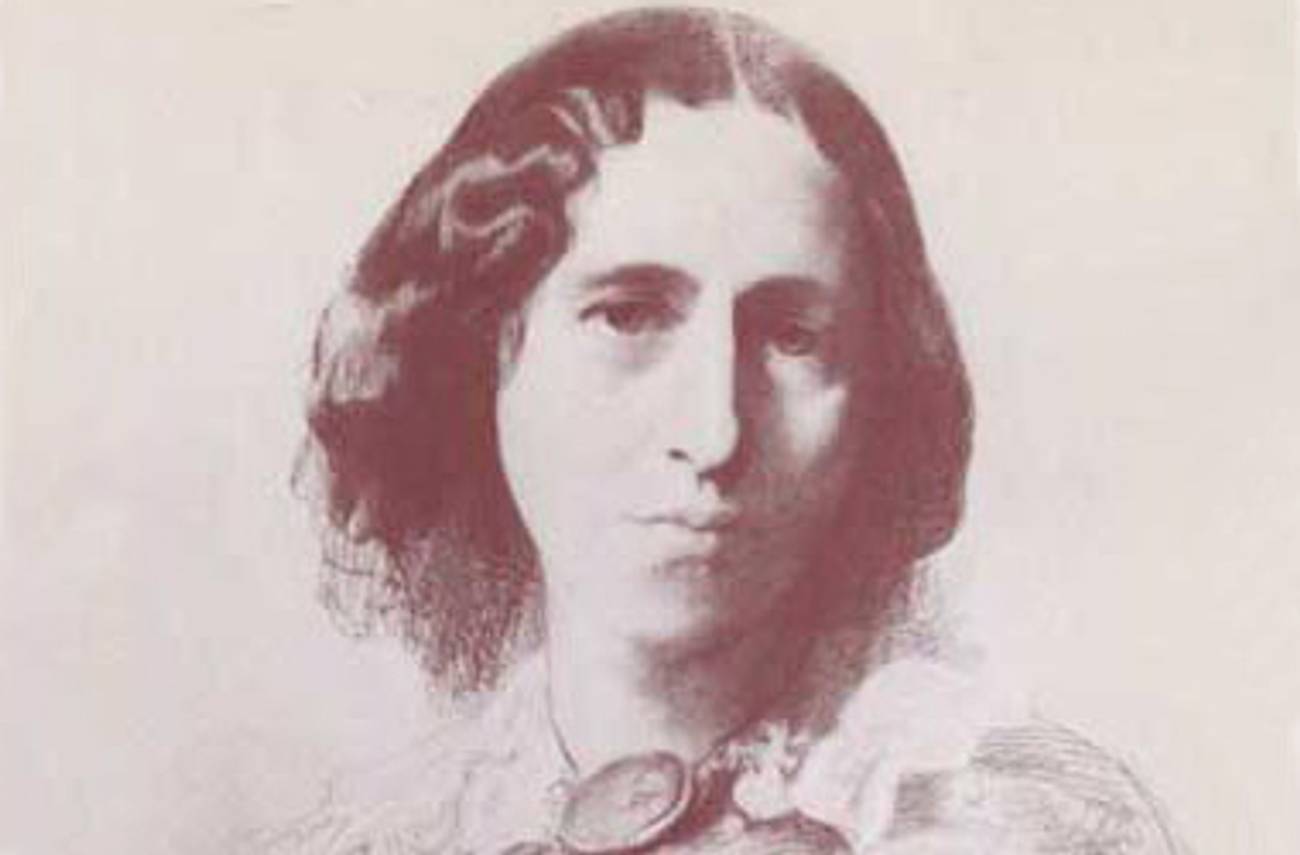Daniel and the Lions’ Den
Gertrude Himmelfarb charts Victorian novelist George Eliot’s road to philo-Semitism




Daniel Deronda was the last novel George Eliot wrote, and the strangest. When it was published in 1876, Eliot was not just at the height of her fame as a novelist; she was revered as a kind of sage, able to combine the most radical religious and social opinions with an absolute commitment to traditional virtues. Early in her career, when she was still writing under her own name, Marian Evans, she had translated German books of Biblical criticism that challenged the claim of the Bible to be divine scripture. Her personal life was equally advanced: she lived for decades with George Henry Lewes, a man who was married to someone else, insisting that their spiritual bond did not need to be recognized by law.
Eliot was, as Gertrude Himmelfarb writes in her compact and absorbing new book, The Jewish Odyssey of George Eliot, “the rare novelist who was also a genuine intellectual, whose most serious ideas found dramatic expression in her novels.” Yet if her ideas were radical, her fiction glorified the “conservative” virtues—compassion, reverence, self-control. Indeed, Eliot believed that the more freely men thought, the more disciplined their behavior must be. A famous story has Eliot talking about “the words God, Immortality, and Duty,” and saying “with terrible earnestness how inconceivable was the first, how unbelievable was the second, and yet how peremptory and absolute the third.”
This makes Eliot a natural subject for Himmelfarb, the eminent conservative historian, whose admiration for the English 19thcentury has led her to call for a return to “Victorian virtues.” In her new book, Himmelfarb focuses on one particular strand of Eliot’s achievement: her surprising intellectual engagement with Jews and Judaism, of which Daniel Deronda was the fruit. When the novel appeared, following Eliot’s masterpiece Middlemarch, it left readers nonplussed, as she knew it would: “the Jewish element,” Eliot predicted, would “satisfy nobody.” After all, as Himmelfarb says, in the 1870s “the ‘Jewish question’ was of no great public concern, certainly not in England.” And there was virtually no precedent in English literature for a novel devoted to a sympathetic treatment of Jews, Jewish history, and Jewish belief. Only Benjamin Disraeli, who was prime minister when Daniel Deronda appeared, might count as an exception; and compared to Eliot’s, Disraeli’s Jewish novels Alroy and Tancred look like sheer fantasy.
Certainly Eliot did not admire Disraeli’s theories about Jewish racial superiority. Himmelfarb quotes a letter Eliot wrote in 1848, shortly after Disraeli’s Tancred appeared, in which she insists that “the fellowship of race, to which D’Israeli so exultingly refers . . . is . . . evidently an inferior impulse which must ultimately be superseded.” In this, the modern reader, even the Jewish reader, will probably agree with her: Disraeli’s loose talk about Jewish racial purity and the international conspiracy of powerful Jews now looks distinctly ugly. But Eliot went further, writing that “much of [the Jews’] early mythology and almost all their history is revolting . . . . Everything specifically Jewish is of low grade.”
This sort of anti-Semitism was common in the progressive circles Eliot travelled in. As Himmelfarb expertly shows, in a tour-de-force review of mid-19th century German philosophy, the most advanced thinkers of the age—including writers Eliot herself translated, like David Strauss and Ludwig Feuerbach—agreed in using Judaism as a kind of shorthand for everything they considered reactionary and superstitious in Christianity itself. When Feuerbach argued, in The Essence of Christianity, that Christianity was a man-made myth, he traced that myth back to the ancient Israelites, whose God was “nothing but the personified selfishness of the Israelite people.” Karl Marx, the descendant of a long line of rabbis, went even further, writing in his notorious essay “On the Jewish Question”: “What is the worldly cult of the Jew? Bargaining. What is his worldly god? Money . . . . The social emancipation of the Jew is the emancipation of society from Judaism.”
These were the influences that shaped Eliot’s mind. How, Himmelfarb asks, did she leave them so far behind as to achieve the profound philo-Semitism of Daniel Deronda? Himmelfarb finds no sudden conversion, only a series of eye-opening encounters with Jews. Visiting Prague in 1858, Eliot and Lewes went to the synagogue, where “an intelligent Jew was our cicerone and read us some Hebrew out of the precious old book of the Law.” More significantly, in 1866 Eliot befriended Emanuel Deutsch, a Polish-born Jew who worked in the British Museum. Deutsch became Eliot’s tutor in Judaism. Her notebooks, Himmelfarb shows, began to fill with quotations “from the Bible and Prophets, the Mishnah and Talmud, Maimonides, medieval rabbis and Kabbalistic works, as well as contemporary German scholars.” Thanks to what Himmelfarb calls this “arduous initiation,” by the time she began to write Daniel Deronda, in 1874, she knew more about Judaism than most English Jews, not to mention English Christians.
She had also been converted to the cause of Jewish national rebirth, which was Deutsch’s passion. It was two decades before Theodor Herzl would give a name and an organization to that cause, and the word “Zionism” nowhere appears in Daniel Deronda. Yet in The Jewish State, Herzl would credit Eliot with inspiring his mission. Eliezer Ben Yehuda, the restorer of Hebrew as a modern spoken language, moved to Palestine after reading Daniel Deronda in a Russian translation. “By the time the state was established,” Himmelfarb writes, “Israel’s three largest cities, Jerusalem, Tel Aviv, and Haifa, had streets named after George Eliot.”
What earned Eliot such admiration from Jews was her treatment of Daniel, which broke the longstanding tradition of English literary anti-Semitism that stretches from Shylock to Fagin. When the novel begins, Daniel believes that he is English—he has been raised as the ward of a wealthy English gentleman—but he knows that some mystery surrounds his birth. His journey of self-discovery starts when he rescues a beautiful Jewish woman, Mirah Lapidoth, who is trying to drown herself in the Thames. His growing love for Mirah leads Daniel to investigate the customs and history of the Jews, and he forms a friendship with Mirah’s brother Mordecai, who is Eliot’s fictional homage to Emanuel Deutsch.
Mordecai—whose real name, it emerges, is Ezra, like the rebuilder of the Temple—is a passionate believer in Jewish national rebirth: “Revive the organic center: let the unity of Israel which has made the growth and form of its religion be an outward reality. Looking towards a land and a polity, our dispersed people in all the ends of the earth may share the dignity of a national life which has a voice among the peoples of the East and the West . . . . Let that come to pass, and the living warmth will spread to the weak extremities of Israel.”
But Mordecai is dying, and he wants Daniel to become his spiritual heir, to carry on the Zionist dream. Daniel resists this burden, until the dramatic, inevitable revelation that he is himself a Jew—the son of a Jewish actress who gave him up for adoption. When he finally confronts his mother, she tells him that she wanted above all to spare him the stigma of being a Jew: “I have rid myself of the Jewish tatters and gibberish that make people nudge each other at the sight of us, as if we were tattooed under our clothes, though our faces are as whole as theirs. I delivered you from the pelting contempt that pursues Jewish separateness. I am not ashamed that I did it. It was better for you,” she declares. But Daniel responds by affirming a Jewish patriotism that is new in English literature, as it was new in European Jewish consciousness. “For months events have been preparing me to be glad that I am a Jew . . . . It is no shame to have Jewish parents—the shame is to disown it.” At the end of the novel, he marries Mirah and sets sail for Palestine, to work for Mordecai’s cause.
It is no wonder that Jewish readers were so enthusiastic about Daniel Deronda. Eliot received grateful letters from “learned Jews and impassioned Jewesses” in Germany, Poland, France, and America, who “assured her that she had ‘really touched and set vibrating a deep chord.’” Yet as Himmelfarb shows, gentile critics were much less positive. In particular, they complained about Eliot’s decision to tell two stories in the same book. For in addition to the title character, Daniel Deronda follows at equal length the destiny of Gwendolen Harleth, a spoiled young girl whose marriage to a cruel egotist begins her painful moral education. Gwendolen is a much more familiar type in European fiction than Daniel—she looks back to Emma Bovary and forward to Isabel Archer—and many readers have believed that, without its eccentric Jewish elements, the novel would have been better. The 20th-century English critic F.R. Leavis went so far as to prepare an edited version of the book, shorn of the Deronda half and retitled Gwendolen Harleth.
Yet Eliot insisted that she “meant everything in the book to be related to everything else there,” and Himmelfarb argues convincingly that Gwendolen and Daniel are one another’s necessary complement: Daniel is redeemed by joining a larger cause, while Gwendolen is damned by pursuing her own selfish ends. As Eliot wrote, in a passage Himmelfarb applauds, every individual needs “a continual inspiration to self-repression and discipline by the presentation of aims larger and more attractive to our generous part than the securing of personal ease or prosperity.” The Eliot Himmelfarb gives us is more conservative and friendlier to religion than she usually appears—or, perhaps, than she actually was. But even readers more sympathetic than Himmelfarb is to feminism and freethinking will find a great deal to enjoy and ponder in The Jewish Odyssey of George Eliot.
Adam Kirsch is a contributing editor to Tablet Magazine and the author of Benjamin Disraeli, a biography in the Nextbook Press Jewish Encounters book series.
Adam Kirsch is a poet and literary critic, whose books include The People and the Books: 18 Classics of Jewish Literature.
Adam Kirsch is a poet and literary critic, whose books include The People and the Books: 18 Classics of Jewish Literature.